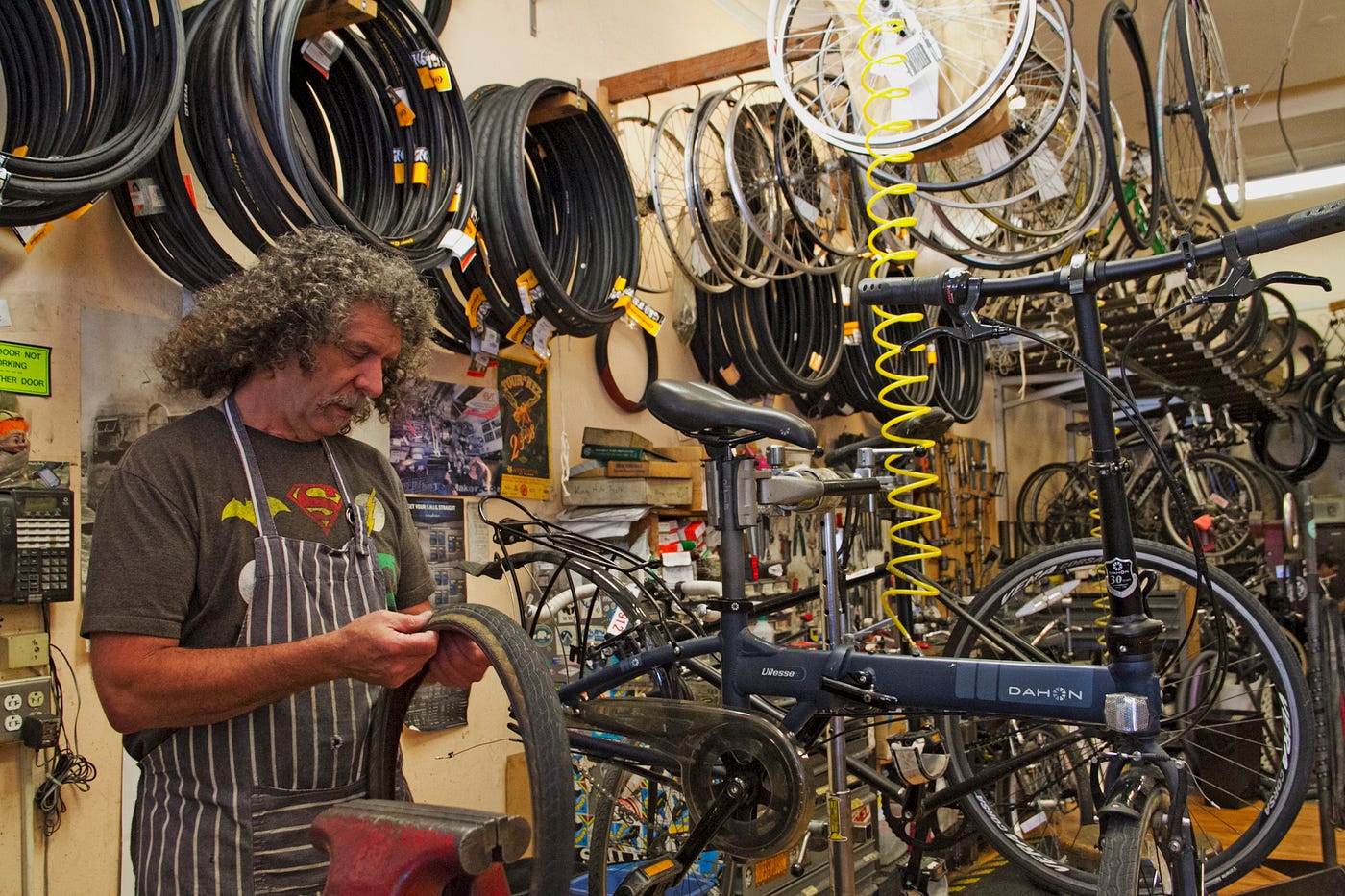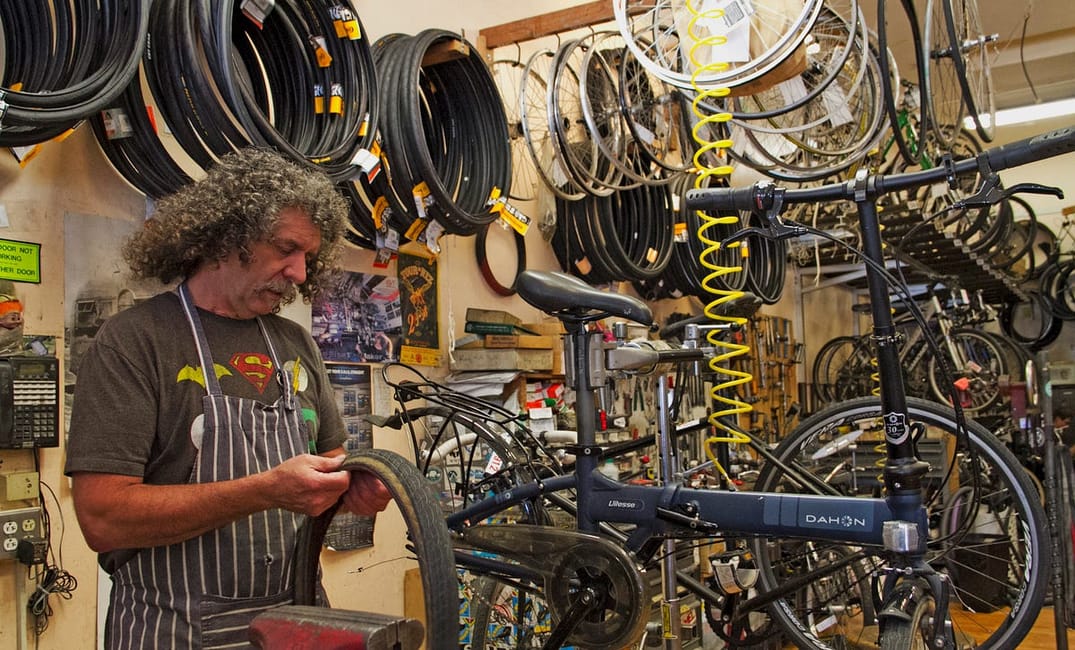
Bill Sparks has a bike frame upside down in a vice. He grips, pulls and tries again, but the seat post just won’t budge.
“That’s what happens,” he growls, “with corrosion, oxidation and steel versus aluminum.” In retreat but not defeat, he grabs a rag, wipes the grease from his hands and moves on to another bike.
About six one with curly shoulder-length hair and a push-broom mustache, Sparks looks like Roseanne Roseannadanna’s butch cousin. When he flexes, veins come out of his arms. They come out of his legs. They come out of his nose.
Sparks has been a mechanic at Berkeley’s Missing Link Bicycle Cooperative since 1990, and even after 26 years, there are still problems that can stump him.
“Sometimes bikes make little noises, and you can’t figure out what’s up,” he says. “Clicks and ticks and chooks. Sometimes it’s elusive, the solution to sounds like that.” He spins the crank of the second bicycle, listens and applies grease to the rear derailleur.

Trying to solve tricky problems with creative solutions has been a strength of the co-op since their founding in 1971. But as a business, Missing Link may have come up against something bigger and even more intractable than a jammed seat post. Bay Properties Incorporated, the owner of the block that includes the repair side of Missing Link, wants to evict the current businesses and convert the space to mixed-use condominiums.
Downtown Berkeley has been struggling to balance development with character. Proponents of new construction point to the shortage of local and affordable housing. They also point to the potential benefits of a larger and more diverse customer base for local businesses.
However,many Berkeley residents feel that “new” does not equal “affordable.”They see proposals like those put forward by Bay Properties as emblematic of Berkeley 2.0, where high-rises replace older structures and chain-retail stores replace iconic local institutions. There is growing concern that small businesses will not be able to afford leases on new retail spaces, or that they’ll be forced out when storefront property is rezoned as residential.
In a unanimous vote held in May of this year, the city Zoning Adjustment Board approved plans for a 16-story, 334-room hotel and conference center at nearby 2129 Shattuck Avenue. A seven-story apartment complex has been proposed for the corner of Telegraph Avenue and Blake Street, on the site of the collection of small local restaurants known as “The Village.” And in the block adjacent to Missing Link, an eight-story mixed-use UC Berkeley complex known as Berkeley Way West is under construction.
“Compared to some current buildings, the proposed mixed-use condo provides more opportunities and attractive housing,” says John Caner of the Downtown Berkeley Association. “The goal of this project is to offer downtown Berkeley positive changes and keep it vibrant.”
In current urban-speak, “vibrant” has two meanings. The first is as an apologetic bandage used by city councils and neighborhood associations when they are unable or unwilling to serve the concerns of poorer residents. The second, favored by realtors, describes a culturally neutered safe space with adequate and nonthreatening levels of ethnic diversity where upwardly mobile professionals can access yoga and really great tapas. Caner’s use seems to straddle the two.
What kinds of opportunities? And attractive for whom? For the people and business owners who currently live and work in Berkeley? Or for those who will acquire it?
Since presenting the plan in the summer of 2015, Bay Properties has been vague about an exact proposal for the property that includes Missing Link but clear about their intention to evict most of the businesses on the block. A formal process has not yet begun, but members of the co-op see it as being only a matter of time before it happens. “It’s not a question of if but when,” says John Suzuki, a 15-year co-owner of the business.
Next door to Missing Link, Mohammed Kilani opened Elite Fashion Exchange in December of 2015. After operating online for several years, this is his first brick-and-mortar location. He’s optimistic about a possible uptick in customers but not so sure that his business would be around to serve them — or that he’d want to.
“The city should have a very good vision of what they want,” says Kilani. “They want to shape this part like Emeryville. Blocks and blocks of buildings.”
Within Berkeley, there is actually quite a bit of support for the changes, even among the 16 co-owners of Missing Link.
Marian Hunting, a 10-year off-and-on mechanic with the co-op, doesn’t mind if the business gets the boot. “Moving is not that big of a deal,” she says. “I work with hoarders. There’s a lot of stuff that needs to be disposed of.” As to the change in local demographics, “People have to live somewhere,” she says with a shrug.
“I think that protesters of these projects are somewhat out of touch with reality,” says Luke Spitzer, a longtime resident of downtown Berkeley and a Cal graduate (class of ’84). He’s been coming to the shop since his student years. “Access to housing is urgent, but it has to be done very carefully. I don’t think they are building affordable housing.”
Like many Berkeley cooperatives, Missing Link was founded by students on the UC Berkeley campus with a mission to offer both gear and repair at affordable rates and to pay worker-owners a living wage. In 1978 they moved off-campus and into a single storefront on Shattuck Avenue in downtown Berkeley. Then in 1994, the repair division moved to its own shop in an available space across the street.
Though both sides are owned and managed by the same 16 co-owners, the two properties are leased from separate management companies. The retail side is on a five-year lease, with no immediate plans to move. The repair shop has been on a month-to-month lease since January of this year.
For Missing Link, an eviction might actually be a benefit. The business would have to reintegrate to a single storefront, at least temporarily, and the move would save $30,000–$35,000 a year in rent. Despite an increase in ridership, business has been on a downslope over the past two years. But with property values rising, and given the shop’s choice proximity to the downtown Berkeley BART station, the savings may be more of a short-lived silver lining than a long-term solution.
Sparks is reluctant about change but matter-of-fact about the situation. “Shit happens,” he says. “Move on and make it work.”







